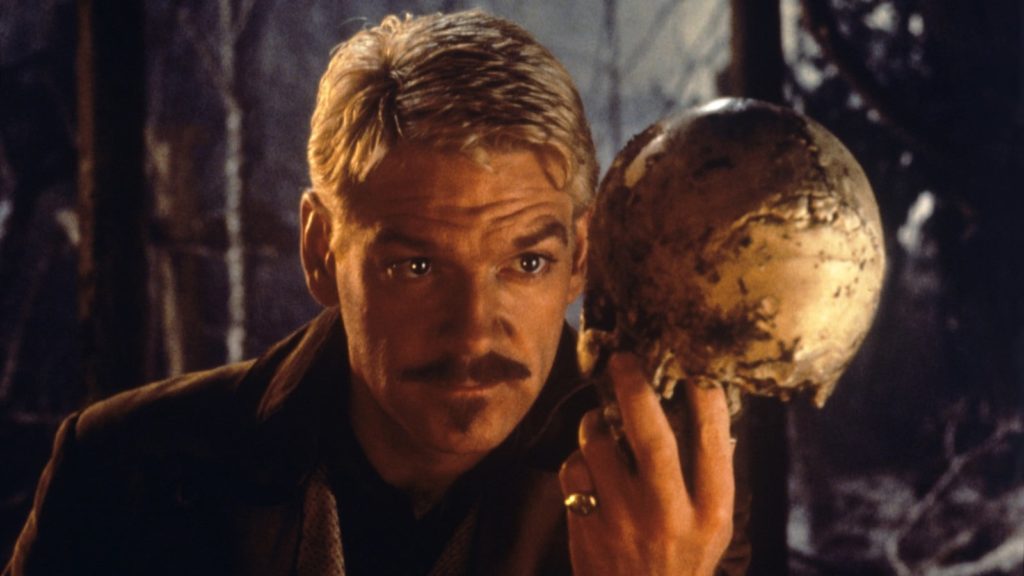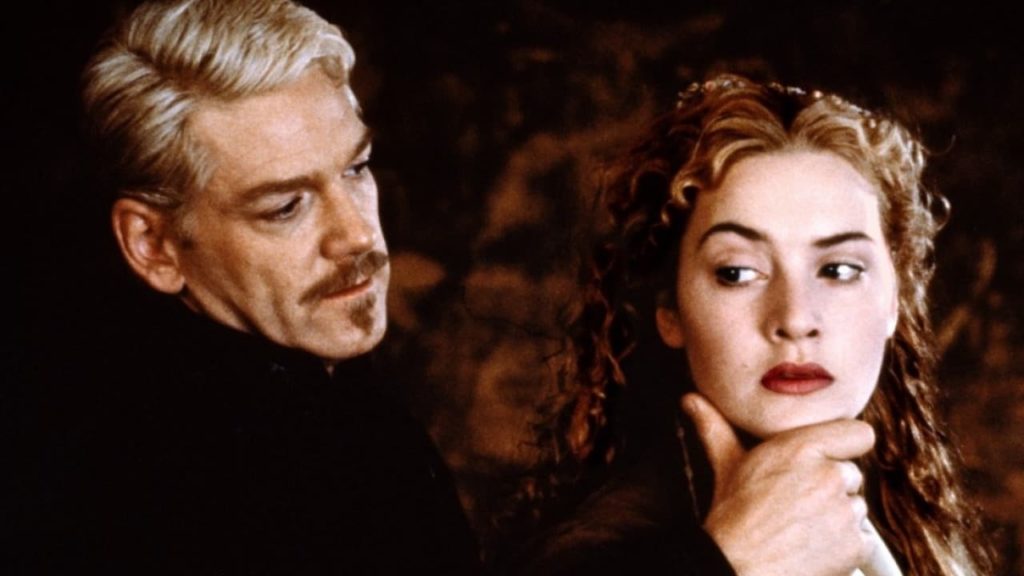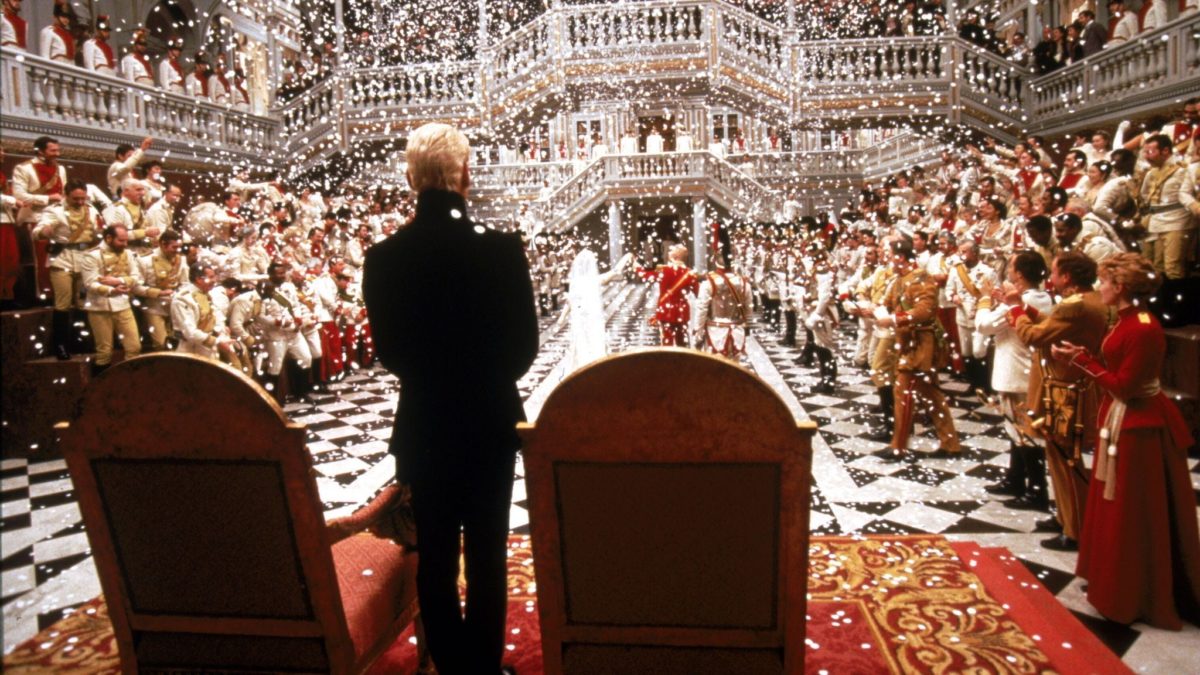Tragedy, comedy, history, pastoral, pastoral-comical, historical-pastoral, tragical-historical, tragical-comical-historical-pastoral, scene individable, or poem unlimited
My journey with Hamlet continues with the biggest adaptation of them all: A four-hour epic helmed by Shakespeare champion Kenneth Branagh. The so-called “eternity version” — which, despite its evocative name, is a gag for how the damn thing never seems to end — leaves the entirety of the play, harmonized between different surviving copies of the initial text, intact. (Bafflingly, Branagh received a “Best Adapted Screenplay” nomination for filming what he could have bought at Borders as a $5.99 paperback. I suppose the Academy wanted to honor his fastidiousness, but it’s still kinda goofy Branagh got a nod for “writing” Hamlet.)
And I can safely say a lot more clicked into place watching this version than Olivier’s handsome 1948 film. How much of that is due to watching a filmed version of the play for the second time in less than a week, and how much of that is simply testament to Branagh’s excellent production and staging, is tough to say. But I must have uttered “OHHhhh” a dozen times. Ironies and mirrored character arcs really stood out this second time through. For example: no fewer than three wayward sons are seeking vengeance for sins against their father in very different ways. Me: “OHHhhh.”

It is frankly an overwhelming adaptation, but in a good way. Hamlet’s story is a tapestry of men and women and institutions reckoning with death. The characters are in an ongoing struggle between performance and inner truth. And it’s all set here in an opulent and disorienting palace: Patterns of black and white like the columns of Siena Cathedral have a dizzying effect, just as Hamlet is existentially disoriented. The film’s real tour de force is the set design of the palace hall: a mirror-bound space in which half the mirrors are secret compartments; schemes and revelations and turmoil take place in the main hall and just as consequentially in these side corridors, as if the setting is a metaphor for Hamlet’s brain and its digressions and multitudes.
Branagh’s direction is arch and dramatic, occasionally dipping into flamboyance. But it is overall quite appealing and well-earned: Hamlet is certainly not a subdued narrative, so Branagh’s over-the-top canted angles and close-ups and general visual aggressiveness is quite apt. That said, there is the occasional off-putting showiness or ugliness, none sticking out worse than the obvious green screen just before the intermission.
In more ways than one, Branagh makes the opposite adaptational decisions that Olivier made in 1948. Where Olivier’s film’s spaces are abstract and illusive, Branagh’s world is unceasingly physical and clearly lit, the busy production design serving as a textural opposite to Olivier’s spare shadows. Branagh makes no doubt of the three-dimensionality of his Elsinore, whereas Olivier’s is always subservient to the flat proscenium.
Branagh’s interpretation of the text is a divergence from Olivier’s as well: Branagh strongly downplays the Oedipal undercurrents of the story. His protagonist is unhinged and falling apart at the seams, Hamlet’s “insanity” much more abrasive than Olivier’s cocksure steadiness. His romance with Ophelia is explicitly spicy, and his “to be or not to be” more introspective.

The cast is almost without blemish. Certainly no one is actively dragging down the material, and several actors are elevating it: Kate Winslet’s Ophelia is incendiary (and if I must continue comparing back to Olivier’s film, such a better rendition of the character it’s almost funny); Derek Jacobi carries Claudius with complexity (though I admit I wish he brought more menace); and about a thousand small performances nail their role with gusto (I’ll never say no to Timothy Spall). Plenty of the castings border on gimmicky, but rarely do they take you out of the moment (though I admit Robin Williams did, despite playing Osric the poorly-dressed guard straight).
Branagh himself is a curious case; while he brings more thought and vulnerability to the title character than Olivier, he’s still 35 years old, looking not a year younger. More than ever, I believe a casting requirement should be that the actor would get carded at a bar. He also brings all his Branagh intensity to the performance: nothing is half-assed, which means we get a LOT of raving and shouting across four hours. His version of Hamlet’s possibly-put-on insanity is a bipolar mania, which honestly aligns quite well with the text even if it requires some endurance to watch. It is, without question, a good and rich performance by someone who deeply understands and loves the material; I feel elucidated, also tired.
More important than Branagh the title actor or even Branagh the director is Branagh the steward of Shakespeare to a modern audience: This is clearly a labor of love, Branagh’s brainchild and passion, and by bringing every line of Hamlet to life, he reveals the play to be such an overwhelming feast: of ideas deeply considered; of language richly formed; of inner lives developed and challenged; and of the human soul laid bare.
Is It Good?
Exceptionally Good (7/8)
Dan is the founder and head critic of The Goods. Follow Dan on Letterboxd. Join the Discord for updates and discussion.


6 replies on “Hamlet (1996)”
This sounds like quite the Epic – the only problem is finding time to watch it all!
Yeah, but Osric just plain sucks, a bad comic vignette figure designed, as far as I can tell, to draw attention away from the one serious structural problem of the play; I cannot imagine there is a good version of him.
Branagh is a little too old, but by historical standards, he’s a baby. I don’t know how people took this seriously when, like, 60 year olds were playing Hamlet. I don’t know how people took Olivier seriously.
In fairness to it being “a screenplay,” Branagh did have to decide what to interpolate material from the Hamlet sources. This represents like 0.3% of it or something like that. I agree it’s a very silly honor.
Yeah I know I’m harping on the age thing too much. Par for the course with Shakespeare adaptations.
Man, you weren’t joking:

Okay, but if that’s not supposed to be a joke itself, I really do hate it.
It’s one of those “reimagined” jams